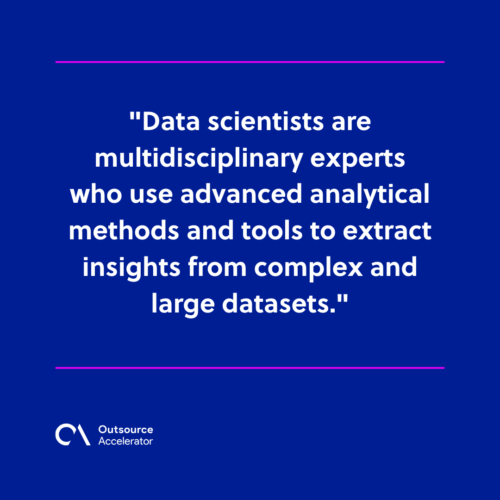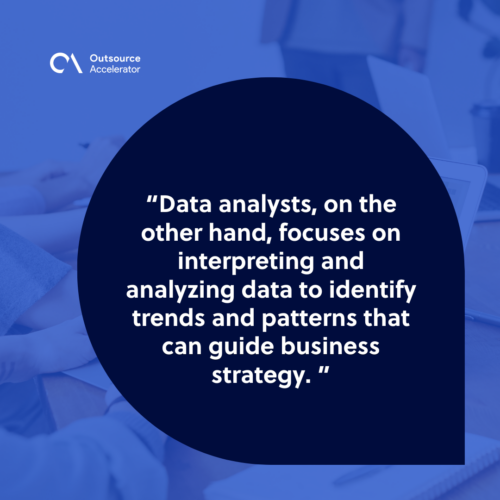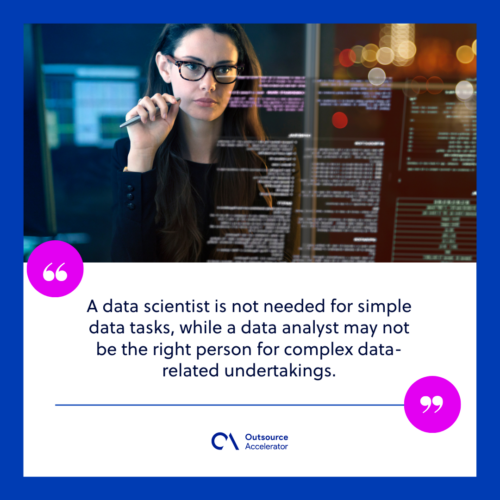Data scientist vs. Data analyst: Differences explained

The rise of big data has emphasized the need for professionals to help organizations make sense of the vast amounts of information they collect.
In fact, the U.S. Bureau of Labor Statistics predicted that data-related roles would have the fastest employment growth, at 36%, between 2021 and 2031.
Two titles that have emerged in this realm are data scientist and data analyst. Though the two terms are often used interchangeably, there are key differences between the two positions.
In this guide, we compare data scientist vs. data analyst roles. We’ll explore their similarities and differences, including which one an organization should hire.
What is a data scientist?
Data scientists are multidisciplinary experts who use advanced analytical methods and tools to extract insights from complex and large datasets.
They identify patterns and trends in the data, which are used to develop predictive models to optimize business performance.
A data scientist must possess advanced skills in mathematics, statistics, programming, and machine learning. Some of the specific roles of a data scientist are:
1. Develop, test, and improve models. Data scientists use various statistical models to analyze data and then optimize those models to improve performance. The models are then tested against the data to identify correlations and patterns.
2. Find new datasets. These professionals need to be able to find and obtain new datasets from third-party sources to complement existing ones and broaden their analytics capabilities.
3. Perform exploratory data analysis. This involves conducting thorough statistical analysis to identify any patterns or trends that may have been previously overlooked.
4. Write codes. Data scientists write codes to automate various analytical tasks and allow the company to make data-driven decisions faster and more efficiently.

What is a data analyst?
Data analysts, on the other hand, focuses on interpreting and analyzing data to identify trends and patterns that can guide business strategy.
They work on datasets (smaller in size than those worked on by data scientists) to glean valuable insights and aid in decision-making.
These experts use a variety of tools and techniques to analyze data, such as Excel, SQL queries, and business intelligence (BI) software. Their key roles include:
1. Data cleansing. Cleaning and managing the data is a fundamental function of this role. This involves removing duplicated, incorrect, or incomplete data and ensuring consistency.
2. Developing dashboards and reports. A data analyst uses BI software to develop dashboards and reports that display data meaningfully.
3. Conducting data analysis. Data analysts use statistical tools to find trends, patterns, and how certain business choices affect outcomes.
4. Communicate insights. A data analyst translates data insights into plain and actionable language for other members of the organization.

Data scientist vs. Data analyst: Similarities and differences
While the terms data scientist vs. data analyst do have some similarities, they still have some significant differences:
Data scientist vs. Data analyst: Education and work experience
A data scientist typically requires advanced technical education (a master’s or doctorate degree) in fields like computer science, mathematics, or statistics.
Additionally, data scientists are expected to have extensive work experience in data analytics, machine learning, and AI.
Meanwhile, data analysts usually need to have a bachelor’s or high school degree in computer science, statistics, or a related field. Experience in SQL database programming and data analysis is often required as well.
Data scientist vs. Data analyst: Skill comparison
To see how data scientist vs. data analyst skills differ, let’s check out the tools and methods they typically use:
| Data scientist | Data analyst | |
| Programming | Computer science Advanced object-oriented programming Proficiency in programming languages | Basic fluency in R, Python, SQL |
| Mathematics | Predictive analytics Advanced statistics | Foundational math Statistics |
| Software and tools | Hadoop MySQL TensorFlow Spark | SAS Excel Business intelligence software |
| Other skills | Machine learning Data modeling Economics Data visualization Data warehousing Data mining | Data mining Data warehousing Data visualization Analytical thinking Business intelligence |
Data scientist vs. Data analyst: Which should you hire?
Now that you have an idea of between a data scientist vs. data analyst, which one should you hire? The answer depends on your business’ specific goals and requirements.
If you’re looking to tackle complex problems, a data scientist may be the right choice. Data scientists can help you uncover insights and opportunities that traditional methods may overlook.
On the flip side, if you need someone to analyze and interpret data to support day-to-day decision-making, a data analyst may be a better fit.
Data scientists excel at turning data into actionable insights and providing valuable guidance to stakeholders across the organization.
It’s worth noting that while using multiple people for both roles can be helpful, businesses must ensure they are applying the staff correctly.
A data scientist is not needed for simple data tasks, while a data analyst may not be the right person for complex data-related undertakings.

Ultimately, both roles play critical roles in leveraging data to drive business success. If you’re hiring one or the other, consider the factors outlined above to make the best decision.







 Independent
Independent




